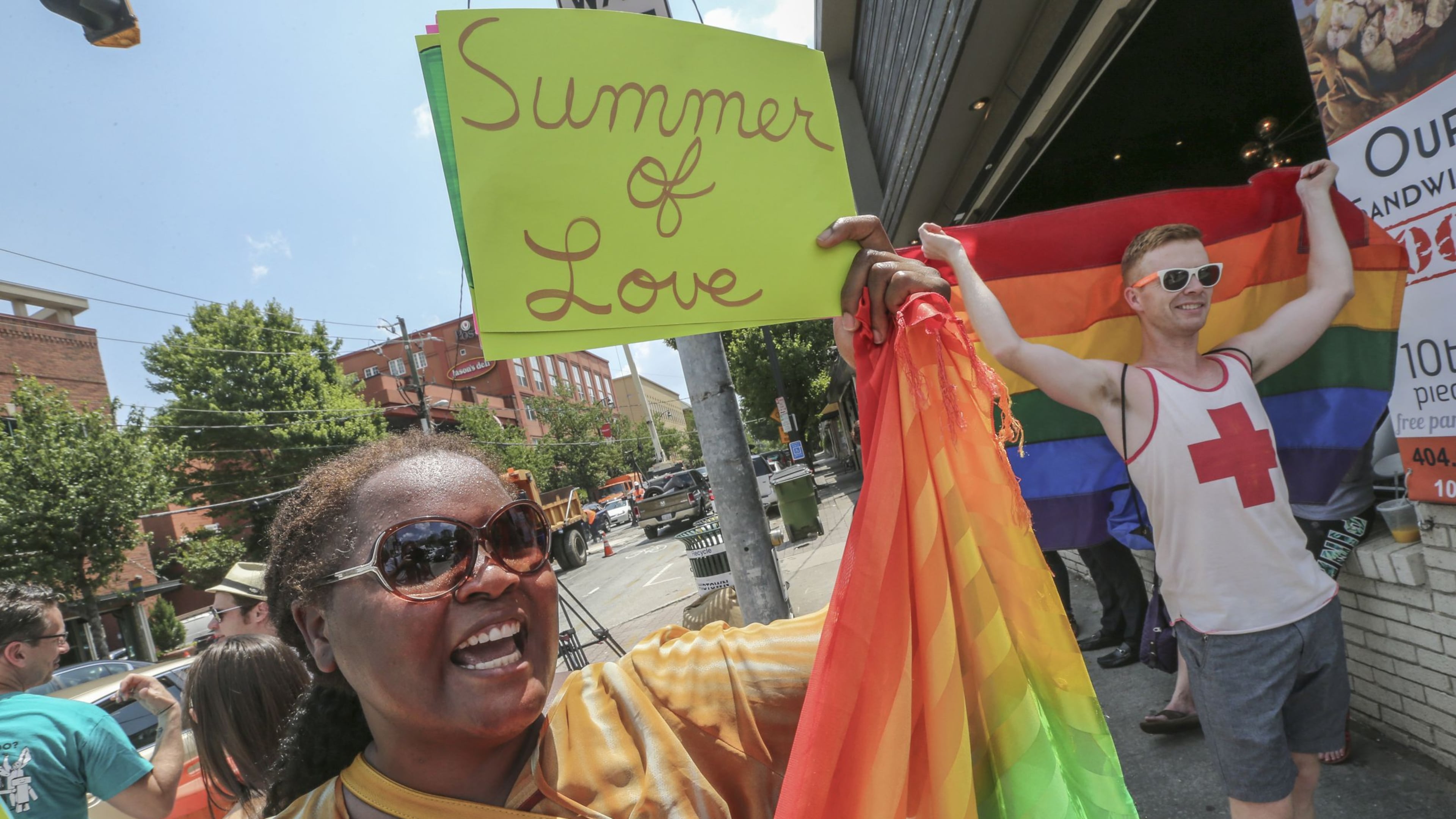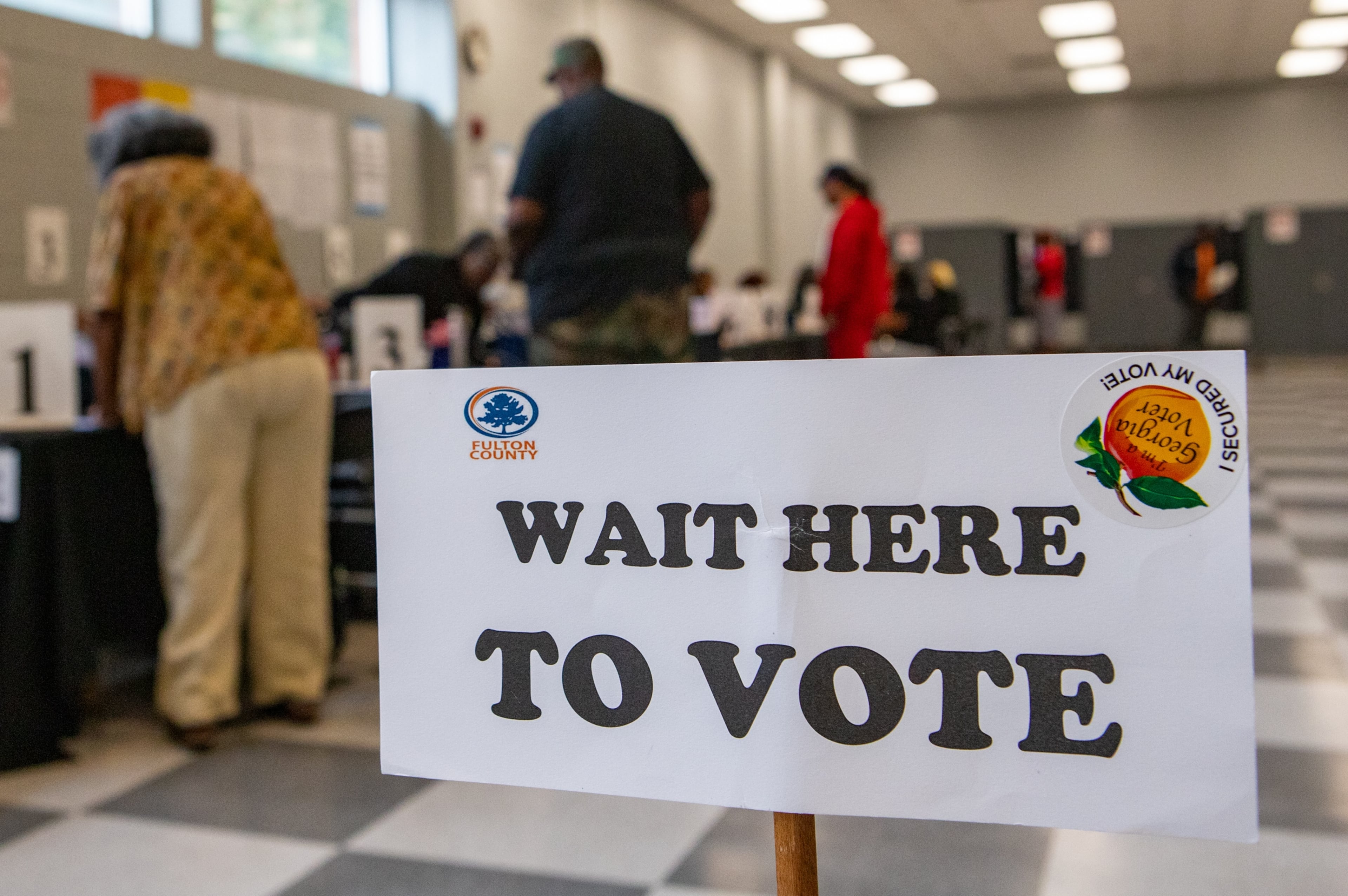Supreme Court declined same-sex marriage case, but the fight is not over

Amid the government shutdown battle, married same-sex couples across the nation breathed a collective sigh of relief when the Supreme Court decided Monday not to reconsider the case that expanded their civil rights a decade ago.
Justices rejected an appeal by former Kentucky court clerk Kim Davis, who famously refused to marry same-sex couples after the high court’s landmark Obergefell vs. Hodges decision in 2015. She’s now responsible for $360,000 in damages and attorneys’ fees.
More important, Americans in all 50 states were spared the chaos the court created when it overturned a federal right to abortion in 2022, resulting in a legal patchwork of states — some protecting reproductive rights and others banning abortion.
Doctors in states such as Georgia feared being arrested for performing abortions, even if to save a pregnant mother’s life, or even on a brain-dead woman. Adriana Smith was forced to linger on life support until her child was born.
In addition, recent Supreme Court decisions to chip away at the Voting Rights Act (and one to be decided in the 2025-26 term) and an impending decision on birthright citizenship made the 820,000 same-sex married couples in America naturally nervous that their rights would be on the chopping block, too.
Decency and civility dictate that Americans should respect the rights of others, but history and recent pushback efforts show that there are Americans willing to respect only the rights of the few and not of all Americans.
Civil rights have expanded, only to face public pushback
As we approach the 250th anniversary of this nation’s founding, on July 4th, 2026, let’s not forget the ideals of life, liberty and pursuit of happiness espoused by the Founding Fathers.

At the same time, the historical records and documents such as the U.S. Constitution show that full citizenship and voting rights were initially limited to landholding white men in the 18th century — several of whom held enslaved Black people as property.
However, the founders’ brilliant idea of allowing constitutional amendments expanded the franchise over time to include Black men (15th Amendment), all women (19th Amendment) and 18- to 20-year-olds (26th Amendment). The 14th Amendment granted anyone born in the U.S. the right to citizenship.
However, one of the first executive orders President Donald Trump signed at the start of his second term in office was to strip birthright citizenship even though the Constitution gives no power to the president to amend it.
As to the rights of Black citizens freed and enfranchised after the Civil War in the 1860s, the 50-year period following postwar Reconstruction legalized segregation and elevated white supremacy, even in campaigns for governor, as documented by Gary Pomerantz’s 1996 book “Where Peachtree Meets Sweet Auburn,” about the history of Atlanta.
The Civil Rights movement of the 1950s and 1960s led to the end of separate-but-equal laws, the end of the poll tax effectively denying lower-income voters from participating in elections, and resulted in the Civil Rights Act and Voting Act.
But these rights are under threat. The 19th, an independent nonprofit news organization focused on gender, politics, policy and power, documented an effort by fringe evangelical Christian groups to repeal the 19th Amendment and strip American women of the right to vote. The positions of groups like this have been amplified by officials such as Secretary of Defense Pete Hegseth, who reposted a video on X.
Even as America celebrated the 100th anniversary of the ratification of the 19th Amendment in 2020, five years later, it’s unconscionable that women’s suffrage might be up for debate.
Justices differ on whether Obergefell ruling is or ought to be safe
In 2022, Congress passed and President Joe Biden signed the bipartisan Respect for Marriage Act, which provides federal protection for same-sex marriages. However, there is a caveat: If Supreme Court justices overturn Obergefell, the federal law would protect unions only in states that protected them.
A majority of states currently have unenforceable laws on the books and/or constitutional amendments banning same-sex couples, including every state in the South.
If a couple married in Georgia and the high court struck down the Obergefell ruling, what does that mean for their legal protections and, if they have children, what would that mean for them?

Supreme Court Associate Justice Clarence Thomas has called for reconsidering past decisions, including Obergefell. “We have a duty to ‘correct the error’ established in those precedents,” Thomas said.
In a recent interview with The New York Times columnist and podcaster, Ross Douthat, Associate Justice Amy Coney Barrett provided a differing view, saying Obergefell had “concrete reliance interests,” something justices weigh when determining whether to overturn a ruling.
“Reliance interests are things that would be upset or undone if a decision is undone,” Barrett said. Both Thomas and Barrett were appointed by Republican presidents, George H.W. Bush and Trump, respectively.
For now, and under the present court, same-sex couples have dodged a bullet, but just because justices declined to overturn its ruling this time does not mean the fight is over.
As history shows, the fight to establish and maintain one’s civil rights in America is never-ending. One thing Atlanta knows, as the cradle of the Civil Rights Movement, is that citizens have to keep up the good fight.
David Plazas is the opinion editor at the AJC. Email him at david.plazas@ajc.com.


